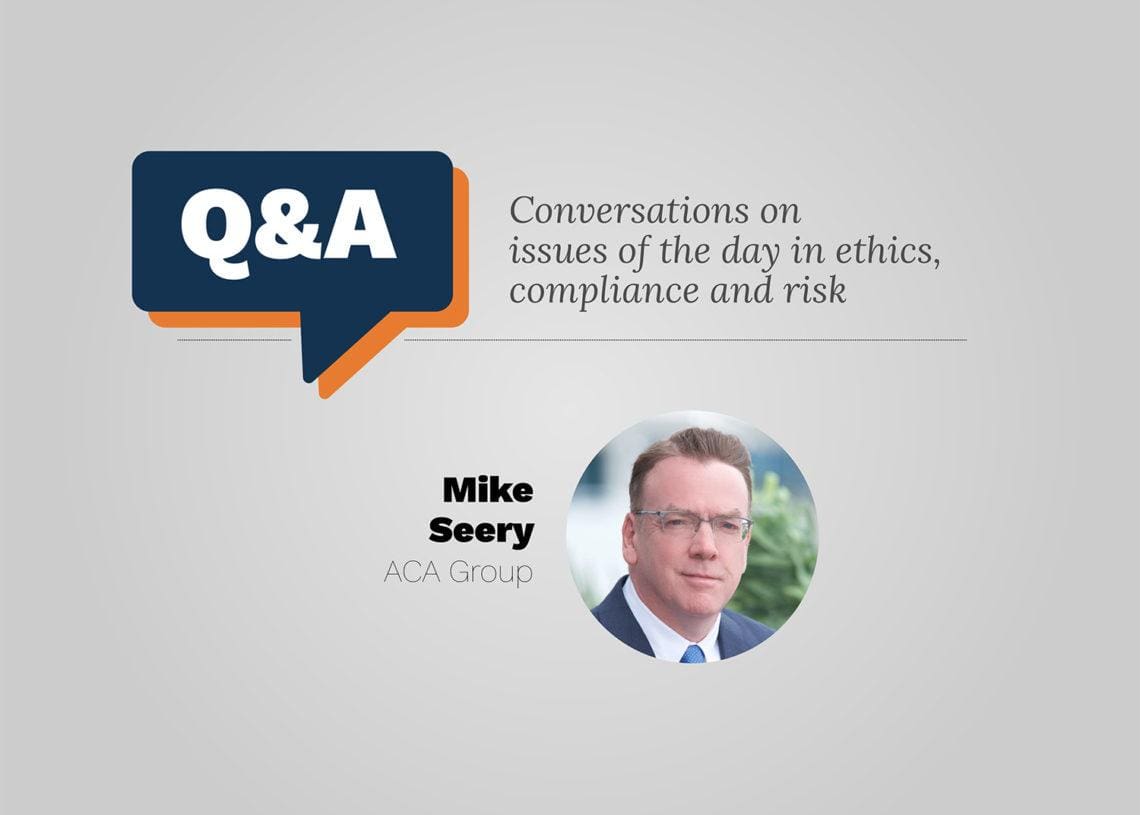President Joe Biden signed an executive order March 9 intended to instill consumer protection and financial stability, prevent illicit uses and in general establish a founding for the development of digital assets. While the action signals the rise of new regulations for cryptocurrencies, the SEC still faces legal headwinds. To gather deeper insight, CCI spoke with Mike Seery, Senior Principal Consultant at ACA Group.
Bill Millar, managing editor, Corporate Compliance Insights (CCI): What are the opportunities for investment managers in the cryptocurrency space?
Mike Seery (MS): Many are asking whether this should be part of their portfolios, and most advisers out there are saying, “Yes, it should.”
It’s a growing asset class, with the listed market caps of all the tokens currently worth roughly $2 billion. If you go to a site like CoinMarketCap.com, you can find market cap, price, volume and other information on all cryptocurrencies and tokens.
We’re seeing growing appetite from clients of all stripes, either taking crypto assets under consideration or they’re already invested.
I believe the SEC has kind of fallen behind the curve in terms of regulating the digital asset space.
CCI: What is happening on the regulatory front?
MS: I believe the SEC has kind of fallen behind the curve in terms of regulating the digital asset space. When initial coin offerings (ICOs) popped up in 2018, the SEC was very effective at clamping down. That was a real investor protection move, and it was successful because so many of those were outright scams.
But more recently, they’ve been slower to react. And I believe this is partly due to what’s becoming a landmark case. The SEC is suing Ripple Labs over the issuance of its XRP tokens. XRP tokens are a form of cryptocurrency intended to help financial institutions accelerate payments and reduce processing costs. The SEC asserts that XRP is actually a security and, therefore, Ripple Labs conducted an unregistered offering.
So, the SEC launched a civil action. So far, Ripple has been very successful in defending and, in fact, scored [another recent victory]. Part of the problem is inconsistency, holding that one cryptocurrency, XRP, is a security, while bitcoin or ethereum probably are not securities. The lawsuit has been going back and forth for over a year.
It would be worthwhile for this space to be regulated. There are a lot of people out there putting a large chunk of their wealth into digital assets. But it’s proving difficult. The SEC is stalled, so it’s taking a long time to assert jurisdiction over the digital space.
Read CCI’s cryptocurrency archives
CCI: How can investment managers gain exposure to cryptocurrency for their clients?
MS: It depends on where you are in the industry. If you’re a private wealth manager and you want to get your clients exposure to, let’s say, bitcoin. It’s not that easy to do. There are no bitcoin ETFs, as the SEC, famously, is rejecting them as they arise.
There are cryptocurrency trusts out there. The biggest is Grayscale Bitcoin Trust or GBTC. But that can trade at a premium or discount, and lately there has been a very big discount to the price of bitcoin. So, it’s an appropriate means to getting exposure, but it does not perfectly track the crypto asset.
Certain firms are also offering 506(c) private funds that invest in cryptocurrencies. It’s a $50,000 initial investment, and liquidity is limited to quarterly withdrawal with certain other limitations.
CCI: Are there any other means to gaining cryptocurrency exposure?
MS: In general, for financial institutions, it takes work. Companies like Coinbase have a platform. But financial institutions, say you’re a private wealth manager, those … have yet to develop solutions that can be directly tied to the securities platforms they use for their clients.
Increasingly, we’re seeing more hedge fund managers who are either adding exposure to bitcoin within existing funds or creating new private funds. And they can get their exposure in different ways. They could use a custodial, Anchorage Trust or Coinbase account. Some are investing in funds who invest in [Chicago Mercantile Exchange] futures on bitcoin and ethereum. And we’re seeing trusts not just in the U.S. but also in Canada and Europe.
Then there are ways to invest in this space indirectly. For example, for a U.S. investor, there are ETFs that aren’t investing in cryptocurrencies themselves but primarily in companies across the cryptocurrency ecosphere. (More on cryptocurrency ETFs.)
CCI: What about investments in the metaverse, non-fungible tokens (NFT) or other digital assets?
MS: For investment managers, that’s much more early stage. We’re seeing funds expressing an interest in those spaces but no real action yet.
Eventually, the SEC or other regulators will get fully involved in digital currencies.
CCI: Where is all this leading for cryptocurrency investments?
MS: Eventually, the SEC or other regulators will get fully involved in digital currencies. Today, groups that are managing large, private funds and investing across the digital spectrum, some of those assets will likely, and probably should, be deemed to be securities. That being the case, a growing number will want to show their large investors that they’re already submitting themselves to the SEC regulatory framework.
And yes, the SEC would like digital asset advisers to register. So that’s an option for registered advisers, private fund advisers, hedge fund and private equity funds. These tend to be hedge fund-style, where you have quarterly redemptions where they invest in more liquid tokens. Or they could be more venture capital-style or private equity-style, where the investments are longer term and speculative.
But in registering, you open yourselves up to all sorts of compliance requirements. You must, for example, follow the custody rule, monitor employee investments so there are no conflicts of interests and on and on.
For now, the point is, yes, the wealth industry can gain exposure for their clients to cryptocurrency. But it’s not seamless. You must move outside your platform or take measures to register your digital currency activities with the SEC.
This interview has been edited for length and clarity.
Mike Seery is a Director at ACA Group who leads the firm’s cryptocurrency advisory practice. Mike focuses on creating compliance programs and direct mock examinations of cryptocurrency and digital asset managers. Mike also advises hedge fund, private equity and SMA clients on complex regulatory and compliance issues, including valuation, investment allocation, fee and expense practices, and SEC exam preparation.



 Bill Millar is a longtime business writer, researcher, roundtable facilitator and speaker. He began his career as a Wall Street practitioner, working in treasury and trading at Euro Brokers, Drexel Burnham Lambert and E.F. Hutton before taking on a 12-year stint at The Economist Group. For the past 30-plus years, Bill has been writing about all manner of compliance and risk management, including deep dives into finance, treasury operations, core and emerging technologies, ethics and taxation. He has written more than 20 books including, "Financial Innovations," "101 Treasury Checklists" and "The One to One B2B."
Bill Millar is a longtime business writer, researcher, roundtable facilitator and speaker. He began his career as a Wall Street practitioner, working in treasury and trading at Euro Brokers, Drexel Burnham Lambert and E.F. Hutton before taking on a 12-year stint at The Economist Group. For the past 30-plus years, Bill has been writing about all manner of compliance and risk management, including deep dives into finance, treasury operations, core and emerging technologies, ethics and taxation. He has written more than 20 books including, "Financial Innovations," "101 Treasury Checklists" and "The One to One B2B." 








